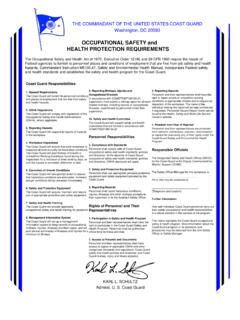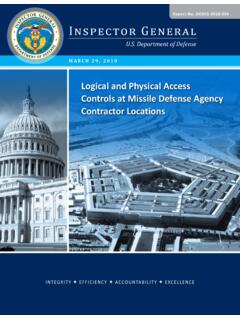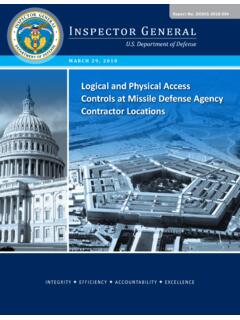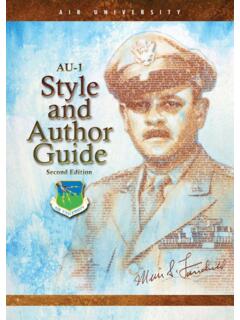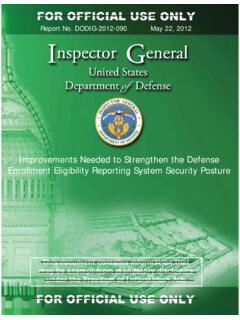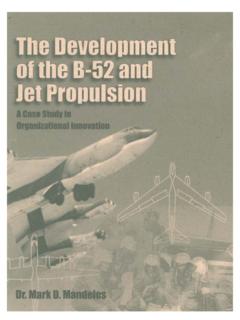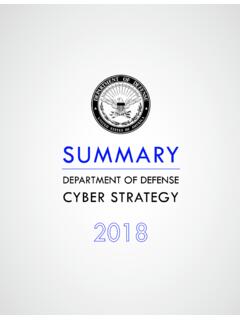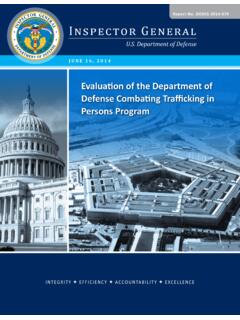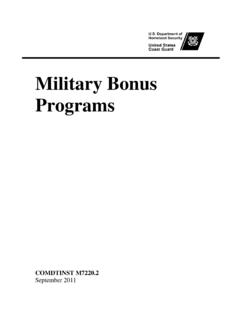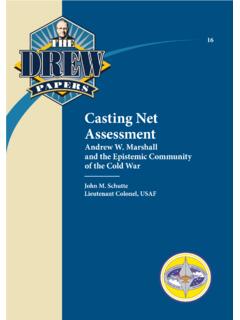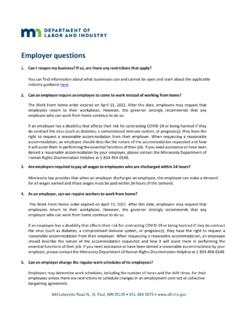Transcription of Frequently Asked Questions -- and Answers
1 1 Frequently Asked Questions -- and Answers Bilateral Agreements, Notes Verbale, Consultative Commission Contract-Related Questions Applicant-Related Questions General Military Exigency Ordinarily Resident Issues Denials and Reconsiderations ID Card/CAC Questions SOFA Stamps, Individual Logistics Support (ILS), and Privileges Termination and Enforcement Temporary Duty TDY: Proper Procedures TDY: Improper Procedures Article X, Yellow Cards and the 6-Year Rule Contractor Verification System (CVS) 2 Bilateral Agreements, Notes Verbale, Consultative Commission (1) What is the Consultative Commission and how does it work?
2 The Consultative Commission is a German-American body created in the Exchange of Notes of 27 March 1998 regarding the application of Article 73 of the NATO SOFA SA (Technical Experts), with the intent that it will serve to review implementation of that agreement. It is co-chaired by the US Embassy and the German Foreign Office and includes representatives from the Laender and the US Forces. The Commission has been used to address problems raised by either party regarding the implementation and interpretation of the Exchange of Notes implementing Article 72 (Troop Care and Analytical Support) as well as Article 73 (Technical Experts).
3 Currently the Consultative Commission convenes on an as-needed basis in Berlin. (2) Will the Consultative Commission overturn a decision by a Land to deny a position as Technical Expert (TE), or to deny an individual seeking TE Status Accreditation (TESA)? No. The Consultative Commission will not overturn any Laender decisions. In case of lack of agreement between Laender and US Forces officials over the terms used in the bilateral Arrangement or over its application, the Consultative Commission shall meet following receipt of a written request from either representatives of the Laender or of the US Forces to seek resolution and issue a written report, which usually contains a written recommendation.
4 (3) Are the examples listed in the Exchange of Notes for Article 73 NATO SOFA SA the only types of Technical Experts (TEs)? No. By definition, an example is a representative of a group. Therefore, the examples are not exhaustive. But following basic provisions must be met: A TE refers to "a person with a high degree of skill or knowledge for the accomplishment of complex tasks of a technical military nature, or of a technical scientific nature, as distinguished from routine mental, manual or physical processes. The skill and knowledge must have been acquired though a process of higher education, or through a long period of specialized training and experience.
5 " (4) The Exchange of Notes indicates that concurrence may be assumed if the German authorities have not provided any response after 5 weeks in the case of contracts and after 6 weeks in the case of individual applications. Doesn't presuming concurrence involve a large degree of risk for the Contractor, contractor employee and the US Government? 3 The language of the Exchange of Notes that provides the basis for this assumption follows: "If no response is given within six weeks, it shall be assumed that no objections exist." In practice, there has been no indication that presuming concurrence has involved risk for the Contractor, contractor employee or the US Government.
6 Although there have been cases with no definitive answer within the agreed upon time limits, there has always been some written correspondence with objections or statement of deferral. Please note that the 5 weeks timeline does not apply for contract approvals IAW Art. 72 NATO SOFA SA (Troop Care services, Analytical Support Services) through the German Foreign Office. (5) The Exchange of Notes indicates that approvals under Article 73 (TESA) can take up to 18 weeks (8 weeks for contract approval followed by 10 weeks for applicant approval).
7 A month delay would severely impact our mission. Is there anything that can be done to accelerate the TESA process? TESA approval is the result of a bilateral, two-phased process and we understand that there is an impact to the mission if approval takes the full 18 weeks allowed by the Exchange of Notes. For that reason, DOCPER will accept individual applications as soon as the contract has been successfully reviewed and approved by DOCPER. While this is not quite a simultaneous submission (that would be contract and individual application at the very same time), it does allow for individual application, review, and DOCPER approval to proceed while contract approval is in process.
8 In addition, DOCPER can provide immediate status upon application approval on the basis of Military Exigency (ME) if such a request has been made by the COR. This means that an individual applicant can apply for and receive ME status even before the contract has been reviewed and approved by the German authorities. It must be remembered that ME status is temporary, unilateral, and conditioned upon approval of both the contract and the individual application by the German authorities. For that reason, DOCPER will only grant ME status for applicants that are clearly qualified and relatively free of those factors related to being ordinarily resident.
9 An applicant granted ME status by DOCPER could still be denied by the German authorities. Therefore ME-approved applicants should consider carefully the consequences of shipping household goods, signing lease agreements, and selling property prior to approval by the German authorities. Back to Top 4 Contract-Related Questions (6) When an approved contract is expiring and the decision has been made to continue providing the same services under a completely new contract, what means are available to ensure that any incumbent contractor employees under the old contract are able to maintain uninterrupted status if they continue under the new contract?
10 For Technical Experts under Article 73, applicants may apply for status with a request for immediate status on the basis of military exigency (an ME request) as soon as the contract has been reviewed and approved by DOCPER. If the new contract is awarded in a timely fashion, and if DOCPER is promptly provided with the required information and documentation for that contract, individuals can usually receive status with little or no break between the old contract and the new. This assumes, of course, that the individuals are qualified under the requirements of the position descriptions approved with the new contract and also that the applicants are not ordinarily resident in Germany.
